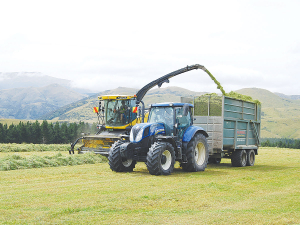Last season was a mixed bag for Waikato contractors, with early planted forage maize, planted on the dry soils around Cambridge, doing badly after germination and failing to meet potential, says Jeremy Rothery, Jackson Contracting.
By contrast, later-sown crops established on the peatland moving eastwards towards Morrinsville and north towards Taupiri have fared a lot better, with a crop harvested last week averaging 26 tonnes DM/ha.
Having started maize harvesting on Feb 26th, Rothery says "we've really had a dream run, with harvesters, trucks and trailers travelling well over the very dry ground, so much so that we will be putting the machines away by the 1st April".
There were worries over large clamps of silage and huge stocks of baleage, with very little demand.
Rothery notes that this season "has been the opposite, with stocks disappearing quickly and us having to turn potential customers away".
"This is leading to what I'd predict to be a potential feed shortage that is getting farmers worried as we move into winter. Already we are hearing stories of bales being trucked up from the Manawatu and farmers locking to sign contracts for maize and grass supply next year."
Rothery predicts that re-seeding equipment is poised for a busy time, but as yet, is being delayed by the rock-hard ground. Further south at Mangakino, in the South Waikato and to the west of Lake Taupo, farmer and contractor Phillip Parry notes that the season has, and continues to be very dry, with reduced crop yields and some de-stocking. Re-seeding is at a standstill, with very dry hard ground and a very real risk of non-germination, without substantial rain.
"It appears that we are seeing more dry seasons, but I worry that many farmers seem to be poor planners when it comes to handling the issue. In most years, we always plant an area of break crops such as swedes and turnips that provide feed after an extended dry spell," says Parry.


















